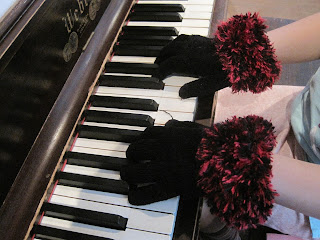What Your Child Needs to Succeed at Piano
We all know that, to be successful at anything, we have to have the right tools. Right? Right.
Believe it or not, learning piano also has its own tool set. And I'm going to briefly cover the most essential tools (excluding books, because music books are a topic in itself) that your child needs at home to succeed in piano.
Believe it or not, learning piano also has its own tool set. And I'm going to briefly cover the most essential tools (excluding books, because music books are a topic in itself) that your child needs at home to succeed in piano.
- Your support! No matter what your child does, this is the most valuable tool you can give them. If they know you're behind them, you care about what they're doing, and you actively take a role in their learning experiences, that's powerful.
- A piano or keyboard. How to choose, how to choose? Basically, a keyboard or digital piano is fine for a beginner. If your child is in their first year, and you're mostly trying it out to see how they like it, or you're doing it because it's a rule that everybody in your house has to take three years of piano before learning another instrument, a keyboard/digital is just fine. However, I would recommend getting one that has Key Touch. This feature will let them create different dynamics using the weight of their fingers, which is important once they have to play a real piano. Also, if your budget allows it, weighted keys are better than non-weighted keys. Once you've decided that they're serious about music, it's time to get a real piano. Don't be afraid to check out second-hand pianos. I have a great piano that I love and that I teach off that my dad got second-hand when I was 10. It still plays beautifully. Do, however, get a good piano. If you have any level of playing, try it out before buying. If you don't play, do some research, or ask a friend with some music background to come along with you. Hint: Shorter upright pianos, the kind that are just a little taller than your counter is high, tend to be lower quality. They just don't sound as good. I have no clue why.
- A metronome. This helps keep time, as well as determine the exact speed a piece should be played. I have the old-fashioned kind. It has a pendulum that swings back and forth, ticking as it goes, and I never need to replace the batteries because it has none. It's a wind-up, like the old clocks. (Which, by the way, is good to know if you do get one of these. I wind mine up every time I use it.) However, there's a number of digital metronomes available on the market as well. Your child should have a metronome by their third or fourth year of piano.
- A place to store their music books. Preferably out of the reach of any toddlers in the house. ;) Seriously, though, if your child has one place to store their books, they won't have to go hunting for them on music lesson day, or be able to tell you, "I can't practice because I don't know where my books are." It can be a bin by the piano, an extra bookshelf -- wherever you have some room and the books won't get bent or damaged. If your piano has a bench with a storage compartment in it, that will be an easy, out-of-sight, convenient location.
- A pencil close to the piano. You weren't expecting this one on the list, were you?! I always keep a pencil at my piano. It's useful for writing notes to self, circling something that keeps getting forgotten, marking practices, and composing attempts. Why a pencil, not a pen? Pencils erase. That is a very important feature when a student is preparing for competition in a music festival or for an exam. Please don't let your child write on their music books with anything that can't erase. If it erases, it doesn't matter what it is. If it doesn't erase, don't use it!





Comments
Post a Comment